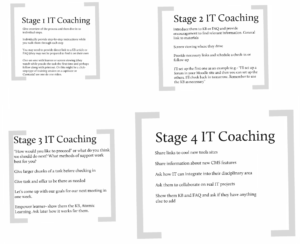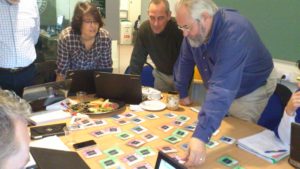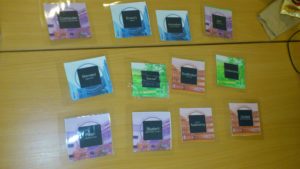 Click on image for larger version.
Click on image for larger version.
What choices are available for building a Knowledge Building course on entrepreneurial skills?
For an online learning event or process focused on promoting entrepreneurial skills it seems logical to plan this using structured or staged self-directed learning (SSDL), including elements of Knowledge Building (KB).
Are there any tools available that could help us?
The main areas of inquiry of the course are the following:
- Personal development skills Business Model You
- CCD
- Knowledge Transfer skills
- Entrepreneurial skills
- Business Planning Business Model Generator
There has been a great deal of activity in how to document learning design recently. In the Larnaca Declaration this has been likened to the breakthrough when musical notation was first invented. Prior to that music could not be recorded. Of course musical notation does not guarantee that a piece of music will sound exactly the same just because it is being reproduced from sheet music but at least there is a chance of reproducing great (and not so great) music using this tool. The point of Learning Design tools is that great (and not so great) learning flows can be reproduced and adapted.
What is available?
- Compendium LD is based on a mindmapping tool. It is freely available for download however I could not get it to work on my Windows 8 PC. There is an alternative set of downloadable icons so that the approach can be used outside the mind-mapping tool. Since mindmapping is an important project management tool in the FLITE project it would be fitting if we could also employ mindmapping as part of our course development toolbox. Compendium LD is part of the Open University Learning Design Initiative which ran a MOOC on learning design earlier this year and which includes the Course Features Card Sort exercise/tool which I experienced at Grainne Conole’s workshop at the EDEN conference in Oslo in June and tried out with the new project team in November. This means that the Compendium LD tool is part of a comprehensive set of course planning tools and strategies.
Below is an example from the Slideshare presentation below showing part of the planning for one learning activity.

This 12 minute presentation is well worth watching for a clear demonstration about how Compendium LD can be used to plan and tweak a course, block or activity as a collaborative and transparent exercise.
2. Learning Design Support Environment and The Pedagogical Pattern Collector This tool is online and available for free use. It is associated with the work of Diana Laurillard. The Learning Design tool is available for free download. I have not been able to get it to work.
There are other tools available such as The London Pedagogoical Planner and Phoebe but these are probably superceded by the above.
Sampling
During the kick-off meeting of the FLITE project in London in November, I tried out one of the OULDI exercises where we looked at which features of an online course we thought would be important in our forthcoming FLITE courses. Just to see what would happen I divided our project group into 2. To be honest they did not have much thinking time but here are the results:

| Group 1 | Group 2 |
| Self-assessment | Problem based |
| Collaborative | Collaborative |
| Scaffolded | Scaffolded learning |
| Innovative for the student | Innovative for the learner or faculty |
| Social | Applied concepts |
| Enquiry based | Debate |
| Blended approach | Active discovery |
| Computer-marked assessment | Reflective log or blog |
| Peer assessment | Peer assessment |
| Student generated content | Student generated content |
| Student autonomy | Student autonomy |
| Guided learning pathway | Guided learning pathway |
There is a overlap on over 50% of the features and the interesting follow-up would be to debate the differences. For example how can blended learning be included in an online course? Is this a reference to local study groups?
Next steps
Three FLITE partners took part in the OLDS MOOC earlier this year. I attended Diana Laurillard’s Keynote on Pedagogical Patterns at the IATEFL conference in 2012 and took part in Grainne Conole’s EDEN workshop in Oslo in June where she presented part of the OULDI pack of course design tools. The University of Greenwich was also a lead organisation of the OLDS MOOC and so this may point to the trialling of the OULDI set of tools. The only constraint I foresee is the learning curve for the use of whichever tool we agree on.
References
The Larnaca Declaration on Learning Design, 2012 http://larnacadeclaration.org/
Laurillard, D Pedagogical Pattern Bank https://annefox.eu/2012/03/26/pedagogical-pattern-bank/